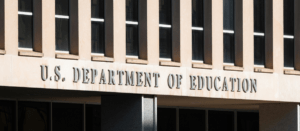Instead of developing a plan to address America’s failing schools and the years of COVID-induced learning loss, the Biden administration passed a last-minute rule to expand access to harmful social media sites on school property. The Senate just voted to halt that.
The Federal Communications Commission (FCC) partly funds high-speed internet access to school classrooms through its E-Rate program. The so-called “Biden Hotspot Rule” would have subsidized schoolchildren’s off-campus use of Wi-Fi hotspots, allowing kids to freely access social media apps without the oversight of teachers or parents.
It is simply a fact that social media is harmful for kids. Whether it is their mental health, academic performance, or ability to focus, children are suffering serious consequences from spending too much time on platforms like Instagram, Facebook, and TikTok. In 2023, the U.S. Surgeon General released an advisory report outlining the myriad of harms that social media poses to adolescents. The report noted that 46% of kids aged 13-17 said that social media makes them feel worse about themselves. It also showed that 64% of teens are “often” or “sometimes” exposed to hate-based content and that many platforms allow suicide or self-harm related content which, in some cases, has led to childhood deaths.
Likewise, the Centers for Disease Control (CDC) Youth Risk Behavior Survey also showed alarming statistics indicating a growing trend among youth, especially girls, who are experiencing “extremely high levels of mental distress, depression, and suicidal thoughts.”
Yet despite all the evidence, the prior administration through the FCC sought to increase students’ access to these harmful sites.
Advocates of the rule argued that it would increase students’ connectivity, giving them the ability to do homework on the bus ride to and from school. However, anyone who has ever ridden a public school bus knows that that is not an environment conducive to getting productive schoolwork accomplished. This problem would be expanded, not decreased, if it were even easier for students to get online via WI-FI hotspots on the bus.
Shortly after the rule was introduced, Sen. Ted Cruz (R-Texas) introduced the Eyes on the Board Act, which Concerned Women for America Legislative Action Committee (CWALAC) endorsed. That bill intended to mitigate the harms that would have been done by the rule by barring public entities from receiving E-Rate funds unless they prohibited access to social media on any subsidized devices or networks.
Fortunately, the rule was not finalized until September 2024, making it subject to the Congressional Review Act (CRA). The CRA allows Congress to introduce a resolution of disapproval within 60 in-session days of a rule’s implementation, giving Sen. Cruz another way to take down the rule now that Republicans have control of both Congress and the White House. So, in early January, within the proper window of time, Sen. Cruz introduced S.J. Res 7, disapproving of the FCC rule. It finally made its way to the floor of the Senate earlier this month and passed by a vote of 50-38. It still needs to make it through the House before being signed by the President. But once passed, the CRA resolution will not only fully repeal the rule, but will bar the FCC from ever implementing such a rule again in the future.
The Senate’s action on this is an excellent first step towards undoing a rule that would have increased kids’ exposure to damaging online content while making their time at school even less conducive to learning. This is an example of Congress using its power to ensure that the government is in the business of helping the next generation, not hurting it.






